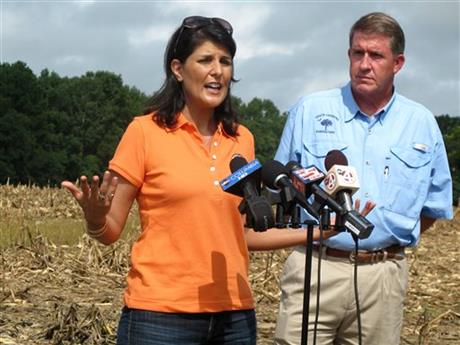
By BRUCE SMITH
South Carolina Gov. Nikki Haley and state Agriculture Commissioner Hugh Weathers discuss the effect of this summer’s heavy rains on farmers in South Carolina during a news conference at a farm outside Harleyville, S.C., on Monday, Aug. 19, 2013. Thirty-six of the state’s 42 counties have suffered agricultural losses of more than 30 percent. Heavy rains have also taken a toll in other states in the Southeast. (AP Photo/Bruce Smith)
HARLEYVILLE, S.C. (AP) — South Carolina’s governor warned Monday that torrential rains soaking the Southeast have flooded fields and wiped out crops, creating a disaster for agriculture in her state alone on par with a tornado or a hurricane.
Soggy conditions around the region have delayed harvests, cut yields and will be felt well into winter as farmers worry there may not be enough feed for livestock when the growing season is over.
“In a hurricane you see the damage. In a tornado you see the damage,” said Nikki Haley, the South Carolina governor, who toured a damage area Monday.
“This is at the same level. This is a disaster for the state of South Carolina,” added Haley, on a visit to the farm of John Pendarvis, some 50 miles northwest of Charleston.
With crop damage exceeding 30 percent in 36 of South Carolina’s 42 counties, Haley has written U.S. Agriculture Secretary Tom Vilsack requesting that the state be declared an agricultural disaster area. If approved, qualifying farmers would be able to secure low-interest loans.
As of Monday, 45 inches of rain had fallen this year in Charleston, about 13 inches above normal. Above-normal rainfall has been reported elsewhere around the Southeast.
At Pendarvis’ farm, a nearby vegetable field had standing water and small green sprouts at a time when the squash should be ready for harvest.
Haley joined Pendarvis, state Agriculture Commissioner Hugh Weathers, agriculture officials and other farmers in a corn field where, while the crop was harvested, the heavy rains posed a challenge to getting the corn out.
“The rain for the past six or eight weeks has really damaged our crops,” Pendarvis said.
Weathers, who farms in a neighboring county, said he had to leave 20 percent of his wheat in the field. He also won’t be able to put in soybeans this year because the ground is just too wet.
The bright spot for farmers, he said, is that the rains have made field grass for cattle and dairy cows abundant. At the same time, he added, farmers won’t be able to harvest as much hay from wet ground, meaning there could be a shortage of feed after the first frost.
Similarly in Virginia, the wet weather has been a mixed blessing.
The Virginia Farm Bureau Federation reports it will be a better season for corn than last year because of the plentiful rain. But yields may suffer in some areas because wet ground could hamper harvesting.
The rain affected harvesting Virginia wheat and barley. It’s also is taking a toll on cotton and flue-cured tobacco, the type used in cigarettes, with yields expected to be less than last year.
Alabama has had lots of rain. But Mary Johnson, spokeswoman for the Alabama Farmers Federation, is not aware of any efforts to seek aid.
The rain has generally helped crops, although farmers have had to make adjustments such as using crop dusters, instead of tractors, to spray for weeds and insects. “It’s hard to get tractors in and not get stuck,” she said.
Jeremy Calvert, who grows fruits and vegetables in North Alabama, said the rain had been good for crops, but hard on him and his help.
“Everything we do has required double the effort,” he said, including controlling plant pests and diseases. “It amplifies the problems.”
In North Carolina, soybean production will be down 23 percent and the flue-cured tobacco harvest down 10 percent, according to projections from the U.S. Department of Agriculture.
David Hardy, the chief of the soil testing section of the North Carolina Department of Agriculture and Consumer Services says that the heavy rains — more than 30 inches in some areas — also have washed nutrients out of soils. Farmers are being urged to be vigilant about soil testing this fall to make sure there are enough nutrients to support future crops.
In Georgia, the heavy rains have meant more labor costs for farmers because of the added costs of planting, spaying and cultivating. The weather delayed the corn harvest and put the peanut crop behind. But a bit drier weather in recent days has helped the crop catch up and better-than-average yield is now expected.
In South Carolina, Haley said while the farming community is in crisis, “we have the backs of our farmers.” She urged South Carolinians to buy South Carolina products and shop at local farmers markets.
“If there ever was a time you need to show your support for our South Carolina farmers it’s now,” she said.
_____
Associated Press writers Michael Felberbaum in Richmond, Va., and Phillip Rawls in Montgomery, Ala., contributed to this report.


